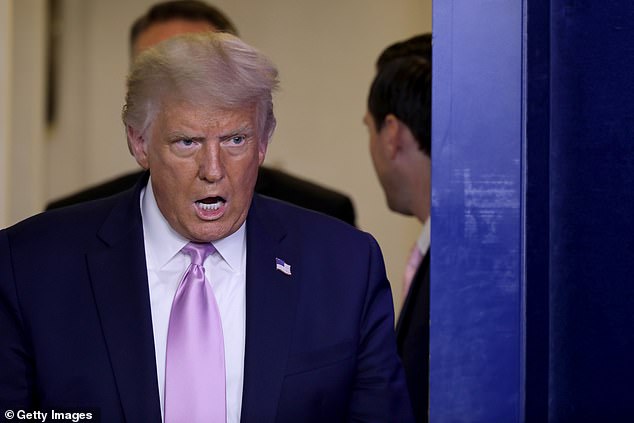More than HALF of American voters believe Donald Trump is racist… while two-thirds think he has widened divisions in US society
- 60 per cent of American voters believe Donald Trump widened divisions in US
- Poll found 12 per cent of his own backers believe the US president is racist
- Last week he became the first US President to be impeached for a second time
Nearly two-thirds of Americans think Donald Trump has caused or widened divisions in US society, while a majority think he is racist, a new mega-poll by former Conservative Party deputy chairman Michael Ashcroft has found.
Trump last week became the first US President to be impeached for a second time, following allegations that he incited supporters to storm the Capitol. Now 60 per cent of voters say he has opened up splits in society – with even a quarter of Trump supporters agreeing.
In a 20,000-sample survey, 57 per cent of Americans think Trump is racist, with only 37 per cent disagreeing: 12 per cent of his own backers think he is racist, rising to 93 per cent of supporters of President-elect Joe Biden.
Two thirds of most Americans think Donald Trump has widened divisions in the USA
Lord Ashcroft examines the ‘Trump conundrum’. He became the first President to be defeated after his first term since George Bush in 1992 despite assembling the largest ever voting coalition for a Republican nominee, with 74 million votes – 11 million more than he received four years earlier, giving him a higher vote share.
Lord Ashcroft argues that Biden, who will become the oldest President after winning more votes than any previous candidate, did so because for millions of Americans he had just one job – removing Trump from the White House. It was a ‘referendum on the incumbent’ which Trump lost.
In trying to discern whether there can be ‘Trumpism without Trump’ in the US, the peer – who over the past four years has polled more than 100,000 people, running focus groups in 19 states – finds that two-thirds of Trump’s supporters said they approved of his actions and the way he conducted himself, suggesting his ‘outrageous behaviour’ was an integral part of his appeal.
Lord Ashcroft concludes that Trump’s electoral appeal derives from issues such as ‘an enduring belief in American exceptionalism, the conviction that constitutional freedoms are important, a positive view of American life’ and ‘the rejection of political correctness’, along with a ‘willingness to tolerate a high degree of friction in politics in the cause of advancing these principles’.
The report sums up the divide between the two candidates: ‘While the pandemic was the most important issue facing the country for Biden voters, the economy and jobs were top of the agenda for Trump enthusiasts. While Biden enthusiasts prioritised race relations and the environment, Trumpers highlighted immigration and national security.’
The frustration of Trump supporters who thought the election was ‘stolen’ from them can be explained by the fact more than nine out of ten expected him to be re-elected.
